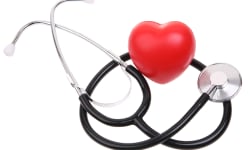Proper preparation
Prevent colorectal cancer: Colonoscopy facts
To mark Colorectal Cancer Awareness Month in March, experts explain the importance of early detection of the third most common tumor disease in women and men. You can also find out how to best prepare for a colonoscopy here.
A tumor in the bowel usually develops from benign polyps. These growths can remain asymptomatic for years, but around 40 percent of them develop into a malignant carcinoma over time. With the help of colonoscopy, intestinal polyps can be found and removed at an early stage, preventing cancer from developing in the first place.
The examination is painless and is usually performed under sedation, a twilight sleep, as bowel specialists Dr. Tobias Frankl and Dr. Dariya Kalcheva from the Medico Chirurgicum joint practice in Vienna explain. Using an endoscope, the doctor can view the entire large intestine, including the rectum. As part of the examination, tissue samples (biopsies) can also be taken immediately in the event of abnormalities and existing intestinal polyps - which can be precancerous - can be removed directly.
Correct preparation is crucial
Thorough preparation for the colonoscopy is important because the bowel can only be reliably assessed when it is completely empty. It begins three to four days before the examination by adjusting the diet according to the doctor's instructions. The slower the bowel is, the earlier you should start.
When to start screening?
- In recent years, it has been recommended to have a colonoscopy for the first time at the age of 45. Thereafter, if the findings are normal, every ten years. If polyps are found, the intervals should be shortened accordingly.
- In the case of bowel cancer in the family, all descendants are recommended to have a (first) screening colonoscopy ten years before the age of onset of the disease, but at the latest at the age of 40. This should then be repeated every five years.
- In Austria, colonoscopy screening is covered by health insurance for people over 50. In some federal states (e.g. Vienna), the costs of sedation are also covered.
- In the interests of quality assurance in the area of screening colonoscopy, the Austrian Social Insurance, in cooperation with the Austrian Society for Gastroenterology and Hepatology (ÖGGH), has launched a quality certificate for colorectal cancer screening. There are around 250 certified screening centers at doctors' offices and hospitals throughout Austria.
According to Dr. Frankl and Dr. Kalcheva, easily digestible foods such as boiled potatoes, white rice, bread without crusts, ham and cottage cheese are recommended. Also fruit juices without pulp, cream soups or clear tea. Wholemeal products, grains, seeded vegetables such as tomatoes or cucumbers, grapes, poppy seeds and chia seeds should be avoided. The experts also advise leaving out fibrous vegetables such as lettuce or corn during preparation. Flatulent vegetables such as cabbage and onions are also not recommended.
The second step is to take a preparatory solution (laxative) to completely empty the bowel. As the bowel specialists explain, this is done in two divided doses. "If the colonoscopy is performed in the morning, one dose should be taken on the evening before the examination and the other in the morning of the day of the examination. For an afternoon scan, both doses should be taken on the day of the examination. In both cases, the last dose should ideally be taken three to four hours before the examination," say the experts. An additional enema is not necessary if the patient is well prepared.

Wöchentlich topinformiert über Medizin und Gesundheit
If the patient has to take medication regularly, this must be discussed during the consultation a few days before the examination. The doctor will pay particular attention to blood-thinning medication as well as medication that slows down bowel function. Medication often has to be discontinued before the examination.
If the colonoscopy is performed under sedation, the experts recommend waiting until around 30 minutes after the examination before eating, not driving on the day of the examination and generally not doing too much.
This article has been automatically translated,
read the original article here.



















Kommentare
Willkommen in unserer Community! Eingehende Beiträge werden geprüft und anschließend veröffentlicht. Bitte achten Sie auf Einhaltung unserer Netiquette und AGB. Für ausführliche Diskussionen steht Ihnen ebenso das krone.at-Forum zur Verfügung. Hier können Sie das Community-Team via unserer Melde- und Abhilfestelle kontaktieren.
User-Beiträge geben nicht notwendigerweise die Meinung des Betreibers/der Redaktion bzw. von Krone Multimedia (KMM) wieder. In diesem Sinne distanziert sich die Redaktion/der Betreiber von den Inhalten in diesem Diskussionsforum. KMM behält sich insbesondere vor, gegen geltendes Recht verstoßende, den guten Sitten oder der Netiquette widersprechende bzw. dem Ansehen von KMM zuwiderlaufende Beiträge zu löschen, diesbezüglichen Schadenersatz gegenüber dem betreffenden User geltend zu machen, die Nutzer-Daten zu Zwecken der Rechtsverfolgung zu verwenden und strafrechtlich relevante Beiträge zur Anzeige zu bringen (siehe auch AGB). Hier können Sie das Community-Team via unserer Melde- und Abhilfestelle kontaktieren.